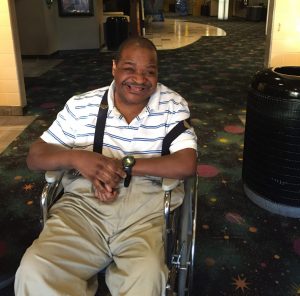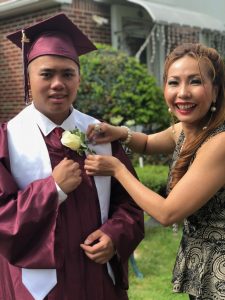As we begin 2020, we know that we have many challenges and opportunities ahead. We are committed to working together with you to enforce civil rights, expand opportunities, and empower people with disabilities. Your donation makes it possible for us to continue our fight together!
Please log in in order to complete your donation.
What We’ve Achieved in 2019 with Your Support
Choice. It’s a powerful word that embraces hope, preference, and dignity.
Choice is now front and center in Tony Butler’s life. Seizing an opportunity triggered by our litigation in Ohio, Tony put institutional life behind him: He now works part time for decent wages, not far from his home where he is happy to report, “I have my own key.”
And after nearly two decades shredding paper for 10 cents an hour in a sheltered workshop in Oregon, Tad Carroll has become a taxpayer, earning a real wage in a real job. Last fall, he began delivering sandwiches and salads for a restaurant, giving him a chance to get out into the community and use his new assistive technology device to engage with customers. As his father shared at a recent Congressional briefing we helped plan, this job represents “a huge step” in Tad’s journey to becoming more independent. “We will still worry about what he will do once his parents are no longer around. But he will be better able to look out for himself and be more in control of his life choices.”

With your support throughout the decades, the Center for Public Representation has promoted, designed, and implemented systemic reforms to ensure people with disabilities can live and work in integrated community settings, and exercise choice in all aspects of their lives.
During the past year, CPR has been in federal courtrooms across the country, litigating on behalf of children in Georgia who are denied equal education opportunities because of their disabilities, and on behalf of individuals confined in segregated facilities in Ohio, and Texas. The Ohio court has preliminarily approved a settlement agreement in Ohio, and a decision is imminent in Texas.
In New Mexico, CPR negotiated a new settlement agreement to ensure the health and welfare of class members in the community. CPR is monitoring an agreement requiring Alabama to develop intensive home-based services for youth with serious emotional disturbance and autism spectrum disorders – services modeled after those ordered in our landmark children’s mental health case in Massachusetts. We also are monitoring agreements mandating community-based services for people with serious mental illness in New Hampshire and people with brain injuries in Massachusetts, as well a settlement requiring Oregon to end admissions to sheltered workshops and create competitive integrated employment for adults and youth with disabilities – thousands of whom had spent years, even decades, in segregated sheltered workshops.
With your support, CPR has stood up to threats to the right of people with disabilities to be valued and included members of the community in all aspects of life. We’re in court on behalf of a coalition of disability rights organizations challenging discriminatory immigration policies, such as the Public Charge Rule, that illegally target people with disabilities. We’ve worked together to keep the Administration from rolling back policies around community integration, disability employment, and inclusion of students with disabilities.
CPR galvanized the disability community to expand access to the services people need to live and work in the community. Your advocacy has helped us secure bipartisan support for long-term funding for programs that help people transition from institutions to the community, and to end the discriminatory payment of subminimum wages to people with disabilities and expand employment supports for real jobs.

In addition, CPR’s Supported Decision-Making (SDM) initiative has mushroomed from a single pilot program in western Massachusetts to a national SDM Technical Assistance and Training Center that advances SDM as a viable alternative to guardianship. SDM is the very embodiment of choice: It ensures people with disabilities the right to make their own decisions about their lives, with the support of friends and family. This includes people like Jimmy, who works with his decision-making team to allocate funds for classes at the community college, with enough left over for a Nintendo game system; and Craig, a 32-year-old man with Down syndrome who works 10 hours a week, lives in his own apartment, enjoys sports, and only asks that his supporters give him the support and information he needs to make his own decisions and exercise his own choices.
Your support has been vital in our successful efforts to promote and preserve choice for individuals with disabilities. But these hard-won victories are at risk. There is an emerging backlash against real choice, orchestrated by those who have co-opted “choice” to argue that individuals with disabilities “choose” to live in institutions, receive services in segregated settings, and earn pennies a day in sheltered workshops. CPR is stepping up to this challenge by creating an Informed Choice Initiative that will expand the legal and practical understanding of choice. This initiative expands and complements our cases in Texas, Alabama, Oregon, Ohio, and New Hampshire and our advocacy on policies concerning community integration and eliminating subminimum wages – all grounded in real choice, informed choice, and meaningful choice to live, work, play, and engage in integrated activities in the community. We also are developing five new litigation projects that will test new strategies to ensure choice.
We need your help to pursue this work. With your support, we will develop new strategies, legal theories, and practical alternatives. With your backing, we will counter the very real threat posed by the misuse of choice – a misuse that imperils the fundamental right to live and work in the most integrated setting protected by federal and state law. Please donate today.
On behalf of our staff, our board, and the tens of thousands of institutionalized persons with disabilities who are still segregated in I/DD facilities, psychiatric facilities, nursing facilities, residential programs, sheltered workshops, and congregate day programs, we are most grateful.
With deepest gratitude,
Cathy E. Costanzo
Executive Director
Please log in in order to complete your donation.
